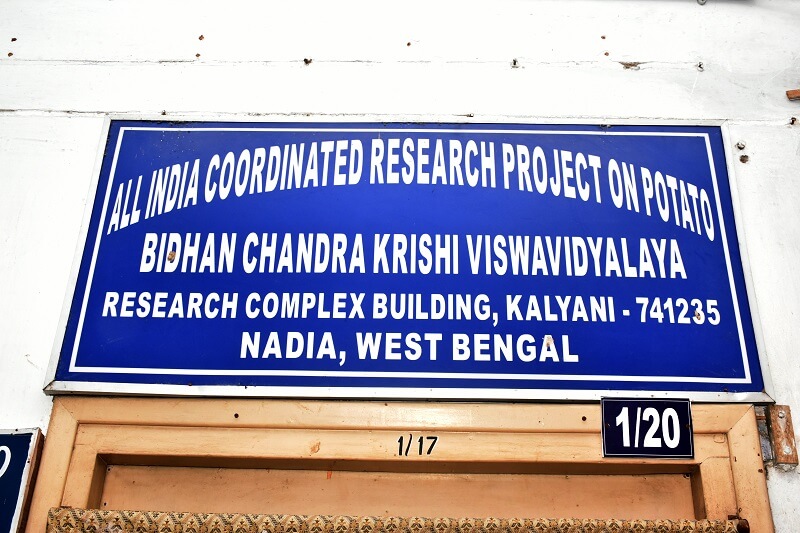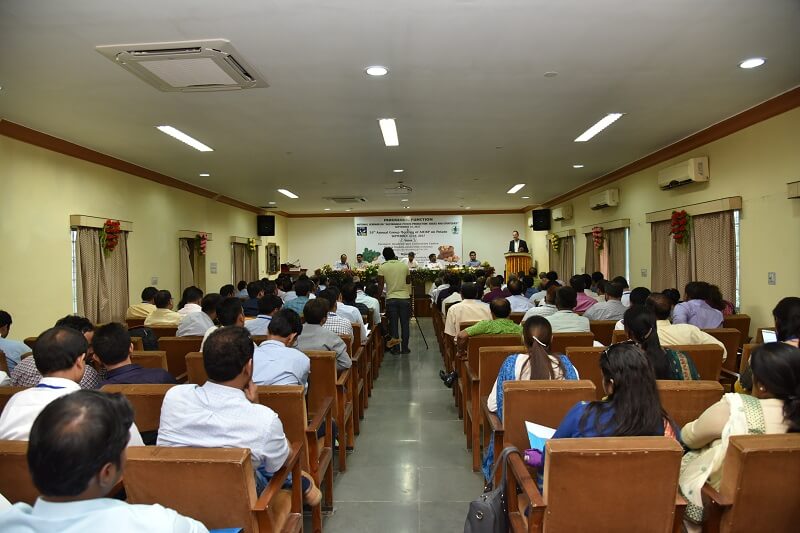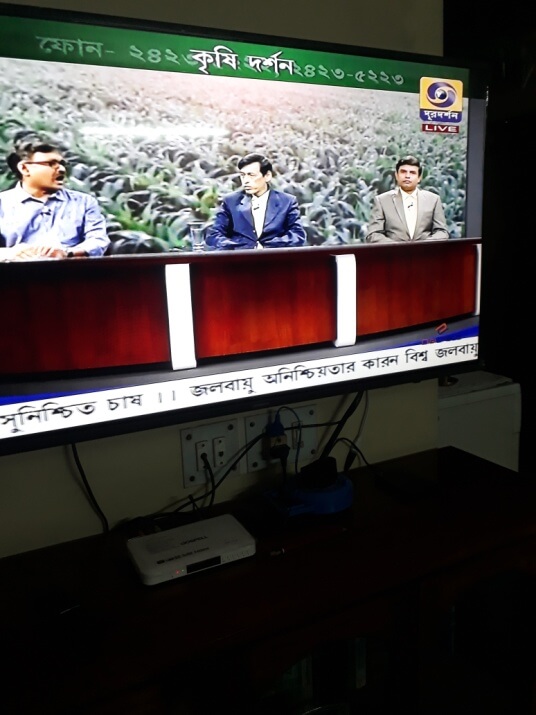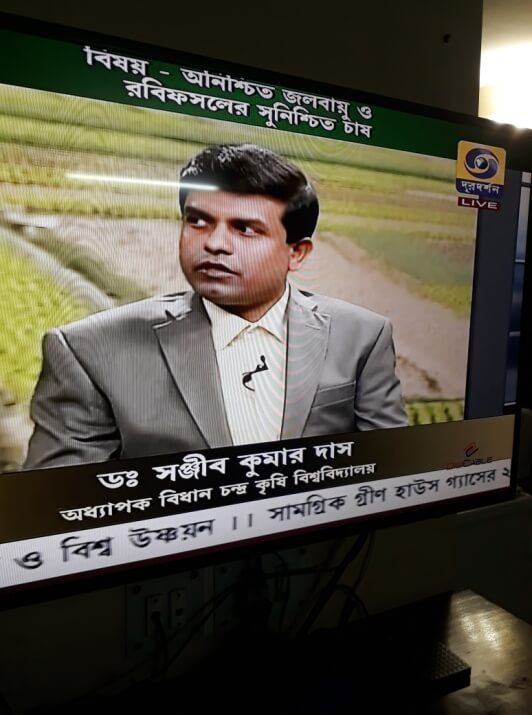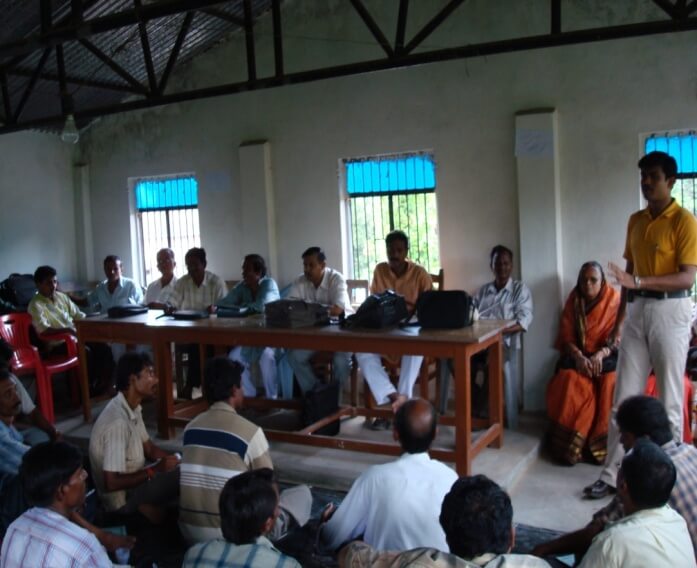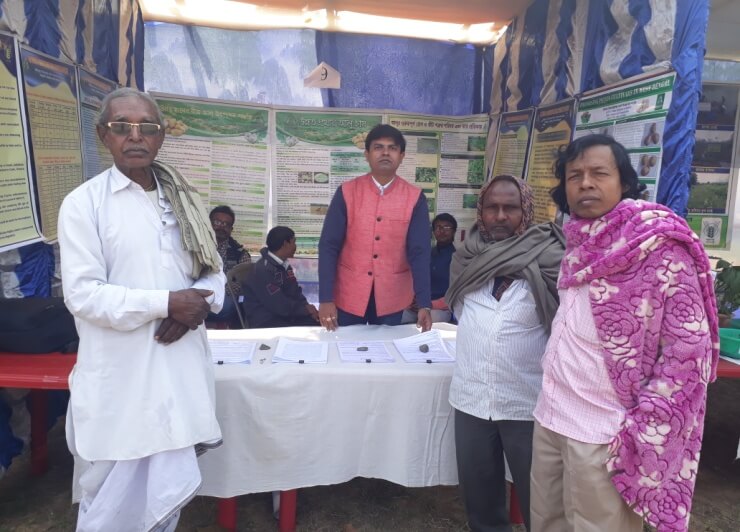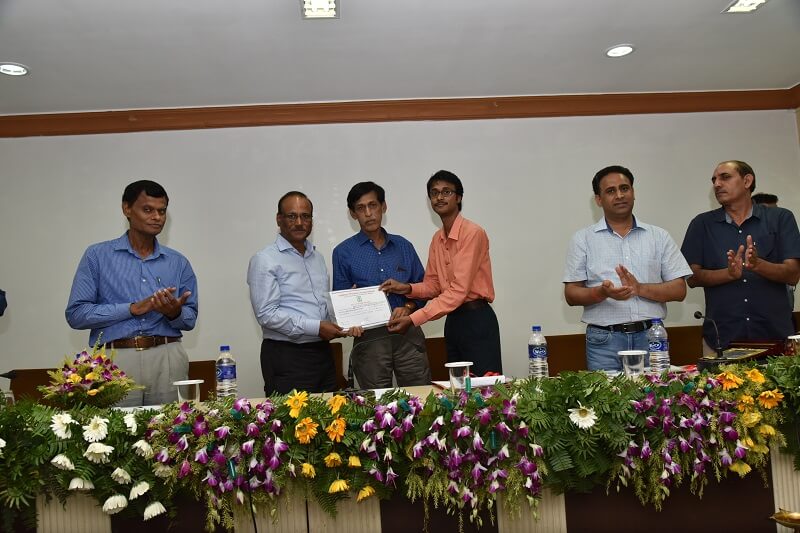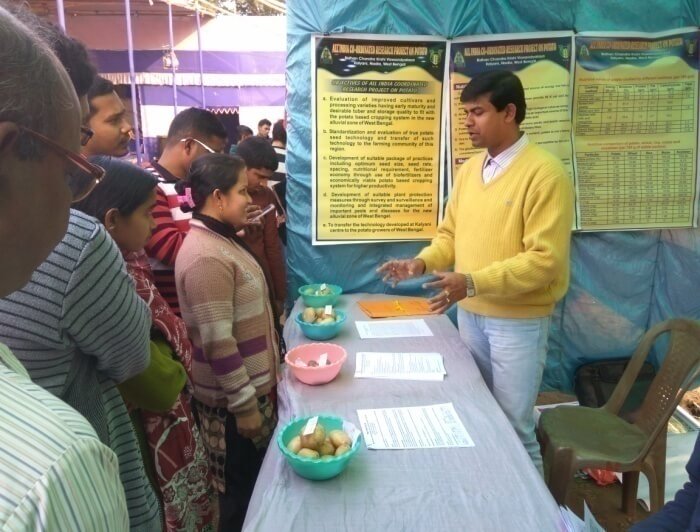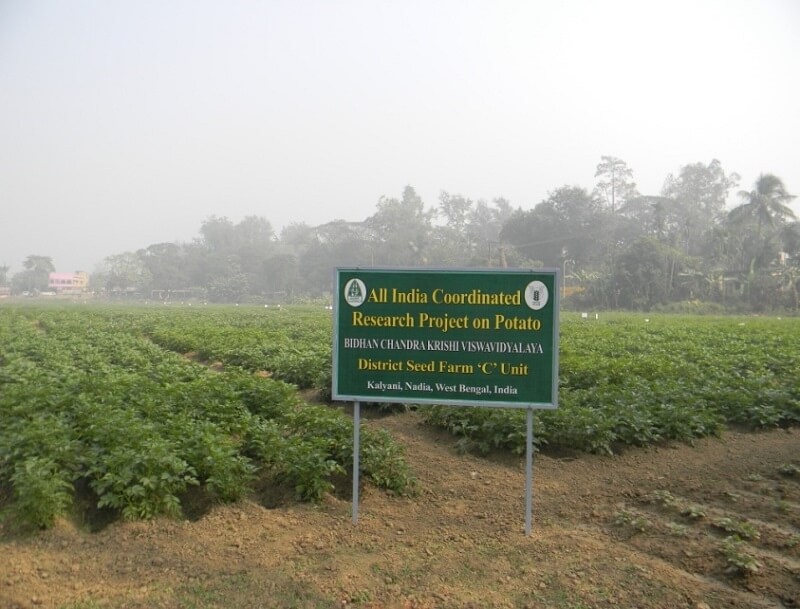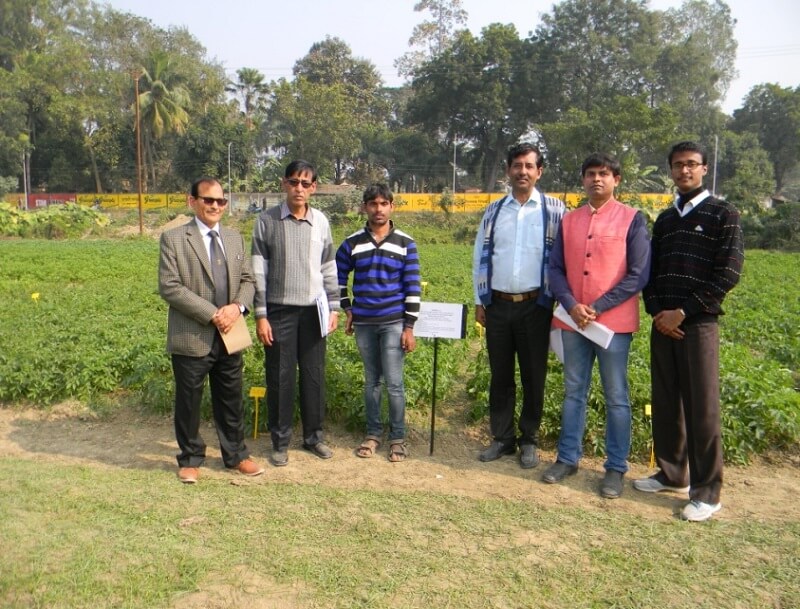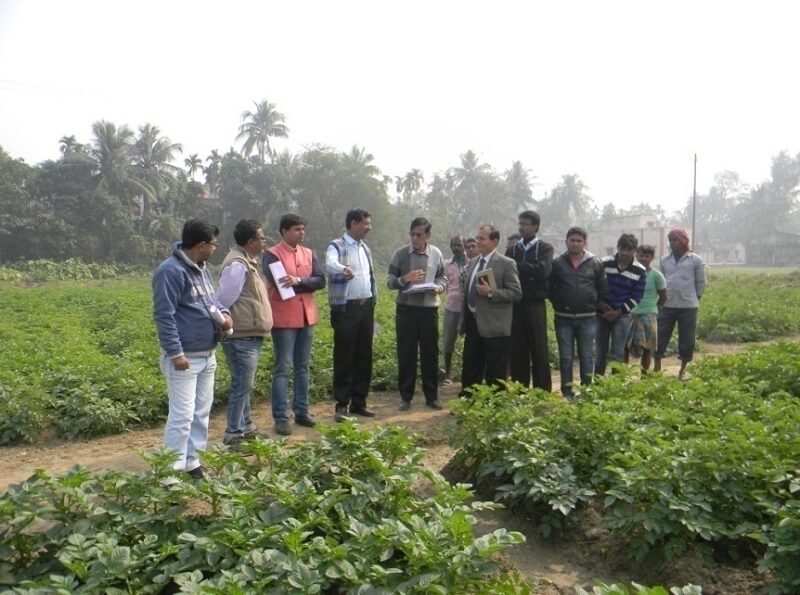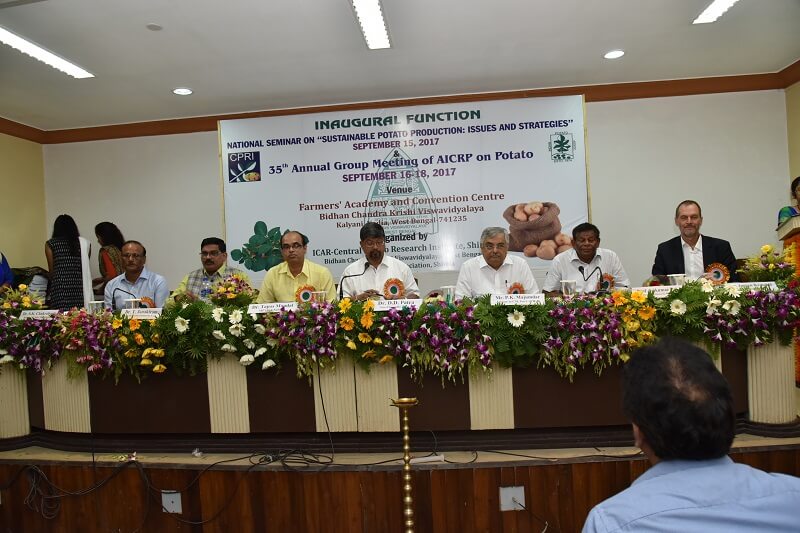AICRP on Potato
Potato is being cultivated in India for the last more than 300 years. It has assumed great significance in Indian agriculture because of its handsome contribution to the national economy. Next to cereal, potato is the most popular crop in West Bengal due to its high production and productivity. Earlier its cultivation was largely confined to the district of Hooghly, Burdwan and Midnapore but with the increasing facilities of irrigation and introduction of high yielding early varieties and development of suitable agronomic practices, potato cultivation is gradually being extended to other districts like Bankura, Birbhum, Nadia, etc.
The AICRP on Potato was established in 1971-72 by ICAR with main center at Kalyani has been continuing to render sincere service to the promotion of potato research and development. The research efforts have already identified a number of high yielding cultivars, different agronomic package of practices and suitable fungicides and pesticides for different agro-climatic regions of West Bengal. The average tuber yield has been increased by introducing improve varieties, better management practices and inclusion of new area suitable for growing potato.
Though many advances have been made in potato research, however, much have to be dining in future. There are major problems of low yield level in some districts of West Bengal. The technology developed is not matching to the growers to the desired extent due to lack of required extension work. There is always a shortage of quality seed crops because crops raised from poor quality seed are not healthy and therefore, render economical loss. The technology has not been prepared as per expectation. Other important factors relating to potato production are the difficulties in their long distance transport, storage and marketing. At present, only 40%-45% of total potato production can be stores in cold storage. Remaining 55%-60% of potatoes in the state have to be stored in farm stores under ambient temperatures resulting in severe loss of food materials due to rotting. Moreover, unorganized marketing being entirely in the hands of middle man, resulting into manmade problem of glut, compelling the growers to distress. Artificial scarcity also compels buyers to pay higher prices. These intermittent conditions of glut and scarcity pose a serious challenge to the sustainability of production.
Year of start/establishment of the Project :1971-72
Staff Strength (Scientific/Technical or Supporting) in Full Details:
| Sl.No. | Present incumbent | Designation |
|---|---|---|
| 1 | Dr. Ashis Chakraborty | Associate Professor |
| 2 | Dr. Anirban Sarkar | Assistant Professor |
| 3 | Dr. Sanjib Kumar Das | Assistant Professor |
| 4 | Mr. Goutam Biswas | Technical Assistant |
| 5 | Dr. Raktim Roy | Technical Assistant |
| 6 | Mrs.Jhuma De | Junior Assistant |
| 7 | Mr.Kamal Kr.Das | Mali Cum Lab Attendant. |
Infrastructure Available:
- Facilities for plant and soil sample analysis (N,P,K analysis )
- Facilities for plant pathological and entomological work (Isolation of pathogens and cultural facilities )
Mandate/Objectives:
- Location specific and strategic research to enhance potato production
- Evaluation of improved cultivars and processing varieties having early maturity and desirable tuber and storage quality to fit with potato based cropping system in new alluvial zone of West Bengal.
- Development of suitable package of practices including optimum seed size, seed rate, spacing, nutritional requirement, fertilizer economy through use of bio-fertilizer and economically viable potato based cropping system for higher productivity.
- Development of forewarning system against major pest and diseases of potato.
- Development of suitable plant protection measures through survey and surveillance and monitoring and integrated management of important pests and diseases of potato for this region.
- Standardization of storage techniques to minimize post harvest losses.
- Training, awareness, frontline demonstrations, on firm trails and publications of the research findings.
- To transfer the technology developed at the centre to the potato growers of this region.
- Development of effective management system for producing disease free potato seed tubers under West Bengal conditions.
No. of Trials Allocated/Conducted During 2013-18:
Allocated:67,Conducted:67
Salient Findings:
- Kufir Himalini and Kufir Khyati hahe been identified as potential varieties which can replace Kufir Jyoti which is being cultivated in West Bengal since 1971.
- Foliar application of B was found superior to soil B application. The potato cultivar ‘Kufri Chipsona 3’ produced maximum total tuber yield with RDF of NPK + 0.1% boric acid as foliar application in three times at 40, 50 and 60 DAP.
- Application of RDF of NPK + 4.5 kg Zinc per ha as basal produced maximum total tuber yield of Kufri Jyoti with higher net return.
- In potato 3 sprays of boron alone or in combination with zinc, along with RDF had a significant effect on potato tuber yield.
- In West Bengal, areas with low water availability, potato crop grown with 3 irrigations at stolon formation, tuber initiation and tuber bulking stages under mulching with paddy straw @ 5t/ha, produced significantly higher tuber yield.
- Under organic production system potato received FYM 30 t/ha + crop residues+ bio-fertilizer produced highest tuber yield.
- Seed production of potato has been standardized and following this technology, seed production of potato has already been started in this state.
- Effective spray schedule against late blight disease of potato :Prophylactic spray with mancozeb (at the time of canopy closure) @ 0.2% followed by cymoxanil+ mancozeb @ 0.3% or dimethomorph+ mancozeb @ 0.3% and one more spray with mancozeb at weekly intervals.
- A suitable warning system for late blight (Phytophthora infestans) INDO BLIGHT CAST MODEL has been developed and being successfully utilized.
- A suitable warning system for the occurrence of aphid species (Myzus persicae and Aphis gossypii) has been developed.
Recommendations at State/National levels (Variety/ Technologies/Patenting etc):
- K.Himalini and K.Khyati has been identified as potential varieties which can replace K.Jyoti which is being cultivated in West Bengal since 1971 and needs its replacement due to its degeneration problem.
- Foliar application of B was found superior to soil B application. The potato cultivar ‘Kufri Chipsona 3’ produced maximum total tuber yield with RDF of NPK + 0.1% boric acid as foliar application in three times at 40, 50 and 60 DAP.
- Application of RDF of NPK + 4.5 kg Zinc per ha as basal produced maximum total tuber yield of Kufri Jyoti with higher net return.
- In potato 3 sprays of boron alone or in combination with zinc, along with RDF had a significant effect on potato tuber yield.
- In West Bengal, areas with low water availability, potato crop grown with 3 irrigations at stolon formation, tuber initiation and tuber bulking stages under mulching with paddy straw @ 5t/ha, produced significantly higher tuber yield.
- Under organic production system potato received FYM 30 t/ha + crop residues+ bio-fertilizer produced highest tuber yield.
- Seed production of potato has been standardized and following this technology, seed production of potato has already been started in this state.
- Effective spray schedule against late blight disease of potato :Prophylactic spray with mancozeb (at the time of canopy closure) @ 0.2% followed by cymoxanil+ mancozeb @ 0.3% or dimethomorph+ mancozeb @ 0.3% and one more spray with mancozeb at weekly intervals.
- A suitable warning system for late blight (Phytophthora infestans) INDO BLIGHT CAST MODEL has been developed and being successfully utilized.
- A suitable warning system for the occurrence of aphid species (Myzus persicae and Aphis gossypii) has been developed.
Special Not Covered in Above:
- Received Best AICRP (Potato) Centre Award for the year 2010-11.
- A National Seminar on Potato Conducted : 1No. (At FACC, B.C.K.V., Kalyani)
Achievements:
- No of Books Published : 3
- No of Paper Published : 32
- Popular articles : 4
- Leaf lets and Folders : 4
- No of Adhoc Projects handled as PI: - 9 Nos. and Co-PI: 4 Nos.
- Total no of M.Sc and Ph.D. students supported within last Five years M.Sc : 11, Ph.D : 07
- No of Training Programmes : 15
- No of Capacity Building Trainings : 5
- No of Bulletins/Technical Manuals : 10
- Kisan Mela / Kisan Sangosthi : 17
- TV talk / Radio talk : 12
- Work shop cum Group Meeting Conducted : 1 no.(35th at FACC, B.C.K.V., Kalyani)
- National Seminar on Potato Conducted : 1no. (At FACC, B.C.K.V., Kalyani)
Technology Developed for the Farmers:
- Seed production of potato has been standardized and following this technology, seed production of potato has already been started in this state.
- Two new varieties (Kufri Himalini and Kufri Khyati) have been introduced in farmers field and gaining farmer’s acceptance which can replace K.Jyoti.
- In potato 3 sprays of boron alone or in combination with zinc, along with RDF significantly increased the tuber yield.
- Application of RDF of NPK + 4.5 kg Zinc in soil per ha as basal found to increase the yield of potato significantly in Zn deficient areas.
- Late blight disease management of potato :Prophylactic spray with mancozeb (at the time of canopy closure) @ 0.2% followed by cymoxanil+ mancozeb @ 0.3% or dimethomorph+ mancozeb @ 0.3% and one more spray with mancozeb at weekly intervals.
- A late blight forecasting system using INDO BLIGHT CAST MODEL has been developed and being successfully utilized.
- A suitable warning system for the occurrence of aphid species has been developed.

